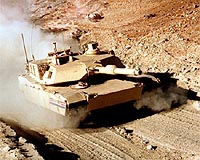| . |  |
. |
Baghdad (UPI) Jul 2, 2009 As U.S. leaders worry whether Iraq's military forces can hold the line once the Americans pull out, U.S. agents are reported to be clandestinely seeking a truce with Saddam Hussein's old cronies in the once-mighty Baath Party to head off a threat to stability. According to the Paris-based Intelligence Online Web site, the Central Intelligence Agency has been negotiating with two rival factions of what remains of the Baath. The party, forced underground in 2003, retains considerable influence among the minority Sunnis who were the pillar of Saddam's regime. One faction is led by Izzat Ibrahim al-Douri, the only member of Saddam's inner circle still at large. He claimed leadership of the banned party after Saddam was executed on Dec. 30, 2006. He is 65 and reported to be frail and sickly, but still in command of at least a dozen militant groups. Based in Syria, Douri has evaded capture for more than six years. The Americans say he is active in financing and organizing the Sunni insurgents. The other, smaller, Baath faction is headed by al-Douri's main rival for leadership of the now-banned party, Gen. Mohammed Yunis al-Ahmad. Once a relatively obscure member of Saddam's general staff, he has emerged as a key figure in the Baath resistance and one of its most effective leaders. Intelligence Online said the meetings between the CIA and the Baathist leaders have taken place in Tikrit, Saddam's birthplace on the Tigris River north of Baghdad, even though al-Douri has a $10 million bounty on his head and al-Ahmad a $1 million bounty. The American negotiators, the report said, are in "direct contact" with the U.S. ambassador in Baghdad, Christopher Hill, and the U.S. military commander, Lt. Gen. Ray Odierno. Mohammed al-Raqqad, the head of Jordan's General Intelligence Directorate, the Hashemite Kingdom's main intelligence service, reportedly organized several of the meetings and participated at the last meeting held in mid-May. Al-Douri attended that gathering, according to Intelligence Online, and said his faction was prepared to support Iraqi Prime Minister Nouri al-Maliki's government and stop attacking U.S. interests if the Baathists, including insurgents, were reintegrated into the political and military mainstream. This apparently did not sit well with all of the Baathist units engaged in the insurgency. Some reportedly refused to pledge allegiance to Maliki's government, claiming it cannot be trusted because of its close relationship with the Iranian regime. Bringing the Baathists, or even a significant segment of their forces, would go a long way toward neutralizing the Sunni insurgency, which includes non-Baathist groups, and reducing the threat to security and stability in advance of national elections currently slated for January 2010. Maliki and his allies deeply distrust the Sunnis, particularly the Baathists who under Saddam were the tormentors of the majority Shiites. Three months ago, on April 8, al-Douri, who was vice president and deputy chairman of Saddam's ruling Revolutionary Command Council, issued an audiotape widely broadcast in the Arab world exhorting Iraqis to rise up against the Baghdad government and return the Baathists to power. Al-Douri's made the call on the anniversary of the founding of the Baath Party, which ruled Iraq from 1968 until Saddam's overthrow in April 2003. Still, for Maliki, the prospect of undermining the insurgency, particularly now that the Americans are pulling out, must be very tempting even as a tactical maneuver. The meetings reported in Tikrit are not the first between the Americans and the hard-line Baathists. According to the Beirut-based Conflicts Forum, a group that advocates contact between the West and the Muslim world, Sunni politicians arranged a meeting between top insurgent leaders and a U.S. congressional delegation in Amman, the Jordanian capital, in July 2007. The Americans, like the Baathists, were deeply concerned about Iran's influence in post-Saddam Iraq but were not able to make any promises, beyond that they would do what they could to end Tehran's interference. European interlocutors later met al-Ahmad in person in Damascus, but nothing concrete emerged from that contact either. Needless to say, Maliki's government was not happy about these contacts and raided the offices and homes of Sunni politicians who had been involved in setting up the meetings. What, if anything, that may have emerged from the reported meetings in Tikrit is not known. But if the CIA is involved, that would indicate the Americans are seriously seeking a cease-fire, or a partial one, that could help Maliki's government through the dangerous months ahead. Share This Article With Planet Earth
Related Links Iraq: The first technology war of the 21st century
 U.S. rearms Iraq, but worries abound
U.S. rearms Iraq, but worries aboundBaghdad (UPI) Jun 30, 2009 If Iraq's new-age armed forces prove to be incapable of maintaining security as the U.S. military withdrawal gets under way, it won't be because they lack weapons. On Feb. 14 the U.S. military announced it would be supplying Baghdad's forces with 140 M1A2 Abrams main battle tanks, F-16 Fighting Eagles combat jets and a plethora of high-tech weapons systems worth around $5 billion. ... read more |
|
| The content herein, unless otherwise known to be public domain, are Copyright 1995-2009 - SpaceDaily. AFP and UPI Wire Stories are copyright Agence France-Presse and United Press International. ESA Portal Reports are copyright European Space Agency. All NASA sourced material is public domain. Additional copyrights may apply in whole or part to other bona fide parties. Advertising does not imply endorsement,agreement or approval of any opinions, statements or information provided by SpaceDaily on any Web page published or hosted by SpaceDaily. Privacy Statement |